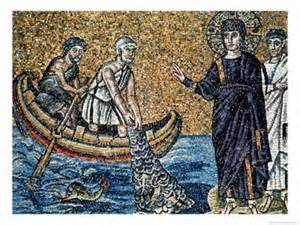
by Fr. Jonathan H. Cholcher
“And Jesus came and spoke to [the eleven disciples], saying, ‘All authority has been given to Me in heaven and on earth. Go therefore and make disciples of all the nations, baptizing them in the name of the Father and of the Son and of the Holy Spirit, teaching them to observe all things that I have commanded you; and lo, I am with you always, even to the end of the age.’ Amen.” (Matt. 28:18-20; italics mine)
What is a Christian? How do we define that term? What, if any, characteristics must a person have to be and not merely to be called a Christian? According to Christ’s word above, the simplest definition of a Christian is a disciple, and the defining characteristics of the disciple are a person living in their baptism (in accordance with the name of the Holy Trinity) and continually learning Christ’s commandments to observe them.
Christians are disciples, if truly they are Christians. As was the case with the eleven disciples (the 12 original apostles minus Judas Iscariot who killed himself after betraying his Lord), being a disciple implies an ongoing, deepening relationship with Christ fraught with difficulties and challenges, but ultimately motivated by hope in the promise of eternal life in the Kingdom of Christ Himself. In our experience of conventional, convenient Christianity, striving to become a serious disciple must be reclaimed by each true Christian.
Disciples and Baptism
A Christian is a person who has been baptized, but importantly, a Christian is a disciple who lives their Baptism in accordance with the name of the Holy Trinity. What’s the difference?
Many people have been baptized, but they treat baptism as a momentary event, disconnected from much or any subsequent activity involving the Church in their lives, or much or any learning and development in Christian truth. People get baptized, and have their children baptized, but then conduct their lives in the world as if nothing happened to change their lives in any significant way.
Saint Paul writes, “For Christ did not send me to baptize, but to preach the gospel, not with wisdom of words, lest the cross of Christ should be made of no effect” (1 Cor. 1:17). Here the Apostle does not disparage Baptism, or make it optional, but emphasizes the basis of Baptism – namely, the gospel (“good news”), the power of the Cross of Christ. Baptism without the effects of the gospel is powerless. If people merely think getting baptized makes them a Christian, without actually living the crucifixion and resurrection of Christ, then they are sadly mistaken. He means the same as our Lord, who said: “Go into all the world and preach the gospel to every creature. He who believes and is baptized will be saved; but he who does not believe will be condemned” (Mk. 16:15-16). Baptism and faith, living and active, are two indispensable aspects of the same process of salvation.
A disciple is a learner (Gk., mathētēs), and in the Christian sense, disciples learn by following and imitating their Teacher. Therefore baptism is first and foremost an ongoing learning experience, not a one-time event. Christians are baptized, “buried with Christ into death,” which indeed happens at a specific moment when we are immersed thrice in the water; however, “just as Christ was raised from the dead by the glory of the Father, even so we also should walk in newness of life” (Rom. 6:4). Baptism is being “alive to God in Christ Jesus our Lord…obedience leading to righteousness…obey[ing] from the heart that form of doctrine to which you were delivered…present[ing] your members as slaves of righteousness for holiness” (Rom. 6:11, 16-17, 19).
In baptism, “by one Spirit we were all baptized into one body,” thereby becoming members of the Body of Christ, the Church (1 Cor. 12:12-14; Eph. 1:22-23; 4:4-6). This Body of Christ, the Church, is also the Temple of the Holy Spirit and the Family of God the Father (see Eph.). Thus baptism – being a disciple – is a dynamic, organic, growing relationship manifested in the activities of the living Body, Temple, and Family. Disciples are children of God who are nurtured, instructed, and made productive by God the Holy Trinity, progressing from grace to grace as they seek to imitate God in love. Witness this in action from the beginning of the Church on the Day of Pentecost (Acts 2:38-47).
The treatment of the Church as a convenience store, social service agency, or urgent care clinic for occasional or emergency religious needs (e.g., baptisms, weddings, funerals, Christmas and Easter services) caricatures everything God intends for Christians. A disciple does not use the gifts of God in the Church as temporarily needed according to individual wants. Unfortunately, many have come subjectively to know the Church and devalue their own Christianity precisely this way.
Baptism demands total commitment. A disciple depends on Christ and His Church as part and parcel of his or her calling to the new life being a Christian. “Another of [Jesus’s] disciples said to Him, ‘Lord, let me first go and bury my father.’ But Jesus said to him, ‘Follow Me, and let the dead bury their own dead’” (Matt. 8:21-22). “A disciple is not above his teacher, nor a servant above his master. It is enough for a disciple that he be like his teacher, and a servant like his master” (Matt. 10:24-25). “Jesus said to His disciples, ‘If anyone desires to come after Me, let him deny himself, and take up his cross, and follow Me’” (Matt. 16:24; see Lk. 14:25-27).
Where the Head is, there is the Body, and vice versa. In fact, following Christ means true disciples are manifest as they are established in the Church. Christ says of Himself, “[O]n this rock I will build My church, and the gates of hades shall not prevail against it” (Matt. 16:18). Furthermore, “[T]ell it to the church…For where two or three are gathered together in My name, I am there in the midst of them” (Matt. 18:17, 20). “If anyone serves Me, let him follow Me; and where I am, there My servant will be also. If anyone serves Me, him My Father will honor” (John 12:26).
Disciples and Commandments
Together with the new life of Baptism, observing, or keeping, the commandments of Christ defines the disciple of Christ. “If you love Me,” says Christ, “keep my commandments…If you keep My commandments, you will abide in My love, just as I have kept My Father’s commandments and abide in His love” (John 14:15; 15:10). Importantly, the keeping of Christ’s commandments is the true expression of love, so the life of a disciple is a continuous testimony of love, ultimately the love of God the Father for the Son given to the disciple and then reciprocated to the Son and the Father.
Our Lord summarizes this dynamic relationship of love enacted in the keeping of His commandments. “A new commandment I give to you, that you love one another; as I have loved you, that you also love one another. By this all will know that you are My disciples, if you have love for one another” (John 13:34-35). Christ spoke this to His disciples immediately following the departure of Judas Iscariot from the Lord’s Supper (Matt. 26:26-29; Mk. 14:22-25; Lk. 22:14-22), during which He had just “loved them to the end” (John 13:1), that is, showed them the goal (Gk., telos) of His love: the New Covenant in His Blood and washing their feet, which shortly would be fulfilled in His crucifixion and resurrection.
By keeping the commandments of Christ the disciple enters into communion with God the Holy Trinity through the Body and Blood of Christ, and demonstrates that communion in the service of others. “For I have given you an example, that you should do as I have done to you. Most assuredly, I say to you, a servant is not greater than his master; nor is he who is sent greater than he who sent him. If you know these things, blessed are you if you do them” (John 13:15-17). Discipleship – Christianity – is a communion (Gk., koinonia) of love nurtured and revealed mutually by observing the commandments of the Lord (see 1 John).
Even in a purely legal sense, Christ Jesus epitomizes the commandments as the observance of love: love of God, and love of neighbor (Matt. 22:36-40). But in His great exposition of the meaning of the Law, namely, what it means truly to be righteous (Matt. 5-7), the Lord explains that the “right kind” of love does not merely exist in outward behavior, but must emanate from a pure heart and mind. For instance, murder really begins as anger, and adultery as lust (Matt. 5:21-28). Therefore, a disciple must first purify the heart and mind and love as God loves “the evil and the good, the just and the unjust,” and in this way the disciple truly strives to perfection (Gk., teleios), which is the goal of our existence achieved by the Perfect God-Man, Jesus Christ (Matt. 5:43-48; 15:18-20; Eph. 4:13).
People tend to reduce their Christian experience, as with baptism, to a bare minimum of requirements, or obligations: attendance on holidays (e.g., Christmas and Easter), giving a certain amount of money to maintain “membership,” keeping the rules when in public, making the sign of the Cross and approaching the icons properly, coming to Confession at least during Lent (whether one feels the need or not), etc. If this is what people consider “keeping the commandments,” then true discipleship has reverted to an artificial, superficial display of legalism, the very thing Christ preaches against.
The keeping of Christ’s commandments is actualized in the disciple by the continuous process of purification from sin, illumination in the will of God (discernment), and contemplation of the glory to come (prayer). The disciple continuously seeks in humility and repentance to be forgiven and to forgive, living in mercy and faith. The disciple continuously seeks to do what is pleasing to God by abhorring what is inherently evil and by practicing what is inherently good, coming to a greater understanding of the image (Gk., eikon) of God as a man or woman, a husband, wife, or celibate, a father or mother, a child or citizen, an employer or an employee, etc. The disciple continuously seeks an audience with God, freeing oneself from distractions of the flesh and world, learning to listen in quiet to the voice of God in His Word, in one’s conscience, and in the beauty of created things.
Of course, these activities of the disciple are typified by life in the Church, the Body of Christ, with its mystical life of ongoing Confession, the Divine Liturgy (Eucharist), daily, weekly, and seasonal services, monasticism, charitable work, instruction in Scripture and the Fathers, lives of the Saints, iconography, etc. “Be holy, for I am holy,” God says through the prophet and apostle (1 Pet. 1:16; Lev. 19:2). “[Y]ou should abound more and more, just as you received from us how you ought to walk and to please God; for you know what commandments we gave you through the Lord Jesus. For this is the will of God, your sanctification” (1 Thes. 4:1-3).
Christians are disciples. Our Lord describes this as “the narrow gate…which leads to life” (Matt. 7:13-14; Lk. 13:24). If we want to be Christians, we are desirous, first and foremost, of eternal salvation, and there is only one road to salvation, Jesus Christ, and His disciples are walking in and on that Road (John 14:6; Acts 4:8-12; 9:2). This is the Way of baptism and observing all that the Lord has commanded us, which is confirmed daily in God’s holy Church.
